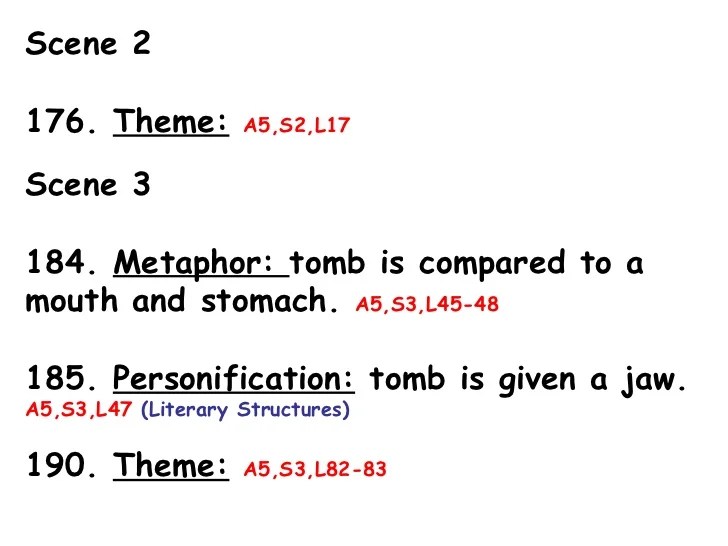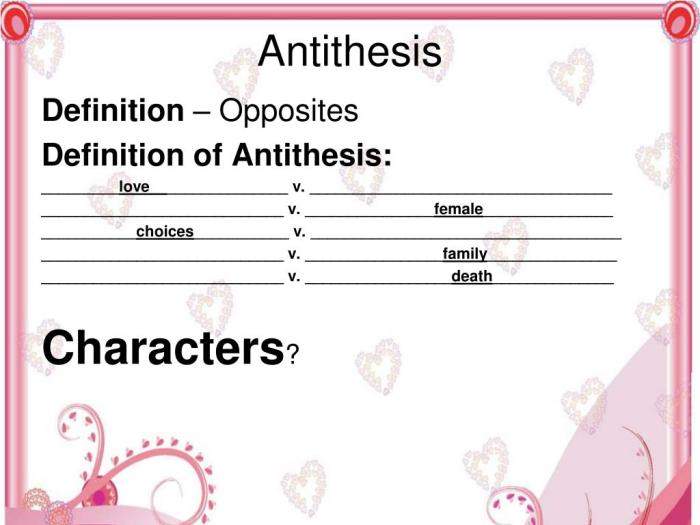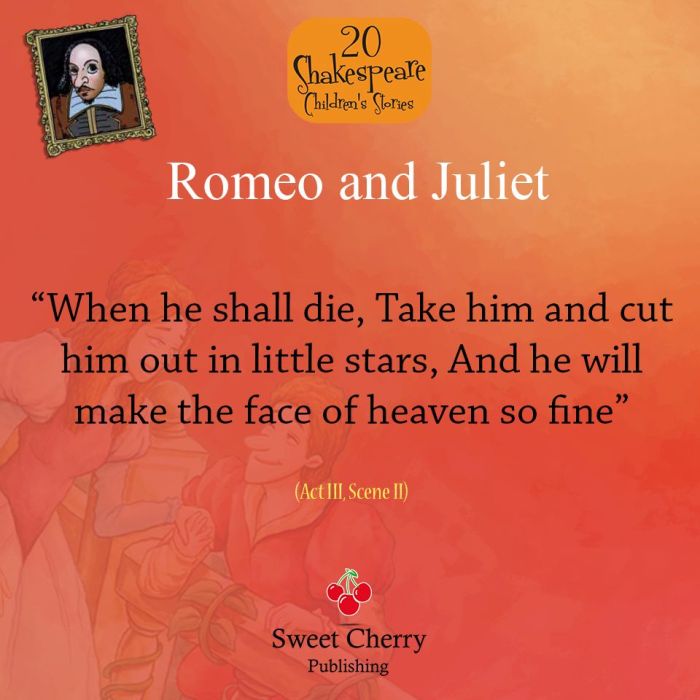Antithesis in romeo and juliet – In Shakespeare’s timeless tragedy, Romeo and Juliet, antithesis plays a pivotal role, weaving a tapestry of contrasting characters, settings, themes, and symbols that drive the plot and heighten the emotional impact.
From the Montagues and Capulets to Verona and Mantua, love and hate, light and dark, the play juxtaposes opposing forces to create a world of conflict and passion.
Characterization

Romeo and Juliet, the central figures of Shakespeare’s tragic masterpiece, embody starkly contrasting personalities and motivations that fuel the play’s conflict and ultimate tragedy. Romeo, a Montague, is a romantic idealist, driven by passion and spontaneity. His youthful exuberance and impulsive nature often lead him to act without considering the consequences, as seen in his hasty marriage to Juliet.
In contrast, Juliet, a Capulet, is a pragmatic and resolute young woman, who despite her tender age, displays remarkable maturity and strength of character. She is capable of deep love and loyalty, but also possesses a keen understanding of the dangers and obstacles that their forbidden romance faces.
Mercutio and Tybalt
Mercutio and Tybalt, two secondary characters in the play, also represent opposing forces. Mercutio, Romeo’s loyal friend and confidant, is a flamboyant and witty individual, known for his quick wit and biting sarcasm. He embodies the spirit of revelry and lightheartedness, often serving as a source of comic relief in the midst of the play’s tragic events.
Tybalt, on the other hand, is Juliet’s fiery and hot-tempered cousin, who fiercely defends the honor of his family. His impulsive and aggressive nature stands in stark contrast to Mercutio’s carefree and jovial demeanor, setting the stage for their fateful confrontation.
Setting

The contrasting settings of Verona and Mantua in Romeo and Julietplay a pivotal role in shaping the plot and the characters’ destinies.
Verona, the primary setting of the play, is a bustling city torn apart by the bitter feud between the Montague and Capulet families. Its streets are filled with violence and hatred, creating a hostile environment that fuels the tragedy.
The Feud
- The Montague-Capulet feud has divided Verona into two warring factions.
- The feud’s origins are obscure, but it has escalated over time, creating an atmosphere of suspicion and mistrust.
- The feud’s consequences are far-reaching, affecting all aspects of life in Verona, from social interactions to political alliances.
The City Walls
The city walls of Verona serve as a physical and symbolic barrier between the Montagues and Capulets.
- The walls divide the city into two distinct zones, isolating the feuding families from each other.
- They represent the insurmountable obstacles that keep Romeo and Juliet apart.
- The walls also symbolize the societal divisions and prejudices that contribute to the tragedy.
Mantua, in contrast to Verona, is a peaceful and prosperous city. It provides a temporary refuge for Romeo after he is banished for killing Tybalt.
The contrast between Verona and Mantua highlights the destructive nature of the feud and the tragic consequences it has for the young lovers.
Themes

At the heart of Romeo and Juliet, a timeless masterpiece by William Shakespeare, lies a complex tapestry of intertwining themes that explore the human condition in all its depth and complexity. Three central themes that stand out are love, hate, and destiny, each playing a pivotal role in shaping the tragic events that unfold.
These themes are not merely juxtaposed but rather contrasted and interwoven throughout the play, creating a dynamic tension that drives the plot and captivates the audience. The characters’ actions and choices become a reflection of the conflicting forces at play, revealing the profound impact these themes have on their lives and the ultimate outcome of their story.
Love, Antithesis in romeo and juliet
Love, in its purest and most passionate form, is a central theme that permeates every aspect of Romeo and Juliet. It is the driving force behind the protagonists’ actions and the catalyst for both their greatest joys and their deepest sorrows.
Romeo and Juliet is rife with antithesis, contrasting love and hate, life and death. Exploring this duality deepens our understanding of the play’s themes. In a similar vein, “Crossword: A Raisin in the Sun” crossword a raisin in the sun challenges us to ponder the contrasts between dreams and reality, hope and despair.
Returning to Romeo and Juliet, the antithesis serves as a poignant reminder of the play’s timeless exploration of the human condition.
Shakespeare portrays love as a powerful and transformative emotion, capable of transcending societal boundaries and overcoming obstacles.
- Romeo and Juliet’s Love:The love between Romeo and Juliet is the play’s central focus. It is a love that defies logic and reason, a love that is both passionate and pure. Despite the obstacles posed by their feuding families, Romeo and Juliet are drawn to each other with an irresistible force.
- The Power of Love:Love has the power to transform individuals and inspire great acts of heroism and sacrifice. Romeo and Juliet’s love gives them the strength to defy their families and fight for their happiness, even in the face of danger.
- The Tragic Consequences of Love:While love can bring joy and fulfillment, it can also lead to tragedy. In Romeo and Juliet, the lovers’ passionate love ultimately leads to their untimely demise, demonstrating the destructive power of unchecked emotions.
Symbolism
The play “Romeo and Juliet” employs rich symbolism to convey its themes and foreshadow its tragic events. Light and dark, flowers, and poison serve as potent symbols, contributing to the play’s overall meaning and creating a sense of foreboding.
Light and Dark
Light and dark are recurring motifs throughout the play. Light represents hope, love, and purity, while darkness signifies danger, secrecy, and despair. The lovers’ meetings often take place under the moonlight, symbolizing their secret and forbidden love. However, the darkness that surrounds their relationship foreshadows the tragic consequences to come.
Flowers
Flowers hold significant symbolic value in the play. Roses, associated with love and beauty, are often mentioned in connection with Juliet. Her name, derived from the Latin word “rosa,” further emphasizes this connection. Conversely, the poison used to end Juliet’s life is extracted from a nightshade flower, representing death and despair.
The juxtaposition of these flowers highlights the play’s central conflict between love and death.
Poison
Poison plays a pivotal role in the play’s tragic climax. The poison that Romeo ingests to end his life is a symbol of his desperation and despair. It also represents the destructive nature of love and the consequences of impulsive actions.
The poison’s swift and deadly effects foreshadow the inevitable tragedy that befalls the star-crossed lovers.
Language and Style

Romeo and Juliet is a play that is known for its beautiful and evocative language. Shakespeare uses a variety of literary devices to create a rich and textured world that brings the characters and their emotions to life.
One of the most striking features of the play’s language is the contrast between prose and poetry. Prose is used for the more everyday scenes, while poetry is used for the more emotional and dramatic scenes. This contrast helps to create a sense of tension and excitement, as the audience is constantly shifting between the two modes of speech.
Use of Language to Reflect Characters’ Emotions
Shakespeare’s use of language also reflects the characters’ emotions and motivations. For example, Romeo’s language is often passionate and flowery, reflecting his romantic and idealistic nature. Juliet’s language, on the other hand, is more restrained and practical, reflecting her more mature and sensible nature.
Famous Speeches and Soliloquies
The play is also known for its famous speeches and soliloquies. These speeches are often used to express the characters’ innermost thoughts and feelings. For example, Romeo’s “What light through yonder window breaks?” speech is a beautiful expression of his love for Juliet.
Juliet’s “O Romeo, Romeo! Wherefore art thou Romeo?” speech is a powerful expression of her grief and despair.
Popular Questions: Antithesis In Romeo And Juliet
What is the significance of the feud between the Montagues and Capulets?
The feud creates a hostile environment that drives the plot and prevents Romeo and Juliet from being together.
How does the use of light and dark contribute to the play’s meaning?
Light symbolizes love and hope, while darkness represents hate and despair, foreshadowing the tragic events to come.